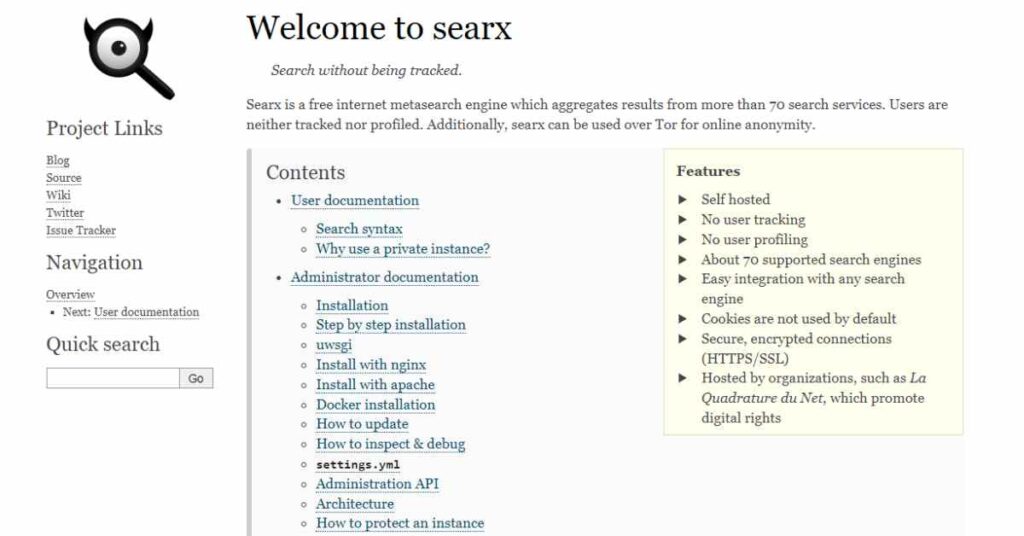Today, the significance of search engines for Linux users cannot be overstated.
They serve as gateways to knowledge, helping you uncover solutions, troubleshoot problems, and explore the vast universe of open-source wisdom.
On the other hand, this digital odyssey holds particular importance, intertwined with the quest for control and customization. Undoubtedly, to imagine that we are not always in control of what we do is a frightening thought, and Linux users, with their penchant for empowerment, understand this sentiment all too well.
In fact, according to W3Techs, a staggering 37.8% of all websites are powered by Linux, a testament to its formidable presence in the digital ecosystem.
In this article, I will delve into the crux of this symbolic relationship between Linux fans and search engines, shedding light on the 10 best search engines for Linux users. Each search engine offers a unique constellation of features, catering to the diverse preferences and priorities for you
Let’s go.
1. Google Search

Google stands tall as the undisputed ruler of search engines, reigning with its remarkable speed, comprehensive results, and advanced search tricks.
Its prowess is deeply woven into the fabric of seamlessly integrating Linux systems, like Ubuntu. Honestly, speed is Google’s ace in the hole. Lightning-fast, it retrieves search results almost instantaneously, sparing you the agony of waiting. This speed forms the bedrock of its dominance.
Additionally, the range of results is as broad as it gets.
Google’s algorithm scours the entire web, leaving no stone unturned, and presents a rich assortment of relevant information. And I find its ability to pinpoint the right details swiftly is unmatched.
Advanced search operators are where Google flexes its muscles. It’s simple, by using operators like quotes (“”) to search for exact phrases or minus (-) to exclude specific terms, you can chisel down to the exact results you desire. This refinement is a boon for precision seekers.
However, Google’s supremacy is not without its shadows. Privacy concerns loom over its kingdom. The data it collects, albeit for customization, sparks worries about personal information falling into the wrong hands.
The specter of tracking raises its head as well. Google’s tailored ads and recommendations, born from user data, can feel like an ever-watchful eye.
2. DuckDuckGo

DuckDuckGo, a rising star in the search engine arena, shines with a resolute focus on privacy, garnering immense popularity among Linux users who prioritize online anonymity.
It stands tall as one of the finest search engines for private browsing. privacy is DuckDuckGo’s banner, proudly waving in the digital wind.
With robust privacy features and a staunch commitment to not tracking user data, it’s a haven for those who seek to navigate the web without leaving behind a trail of breadcrumbs.
A unique feature known as “bang” shortcuts is DuckDuckGo’s secret weapon. You can expedite searches on other sites directly by using “!site” commands, like “!w” for Wikipedia or “!yt” for YouTube. This efficiency sets DuckDuckGo apart, showcasing its innovation.
However, every hero has his Achilles’ heel. DuckDuckGo’s index, while substantial, is dwarfed by Google’s immense database. This often leads to slightly less refined search results. The trade-off between privacy and result precision is a tightrope walk.
Nonetheless, the compatibility of DuckDuckGo with various Linux browsers is a testament to its adaptability. This compatibility is particularly appealing to Ubuntu users who are on the lookout for the most suitable search engines for their system.
3. Bing

Ubuntu users often crave the best search engines for Linux that cater to their unique needs.
Bing steps onto the stage, presenting an alternative path for those looking beyond the usual options. Bing, under the Microsoft umbrella, offers a distinctive proposition.
Its integration with Microsoft services creates a harmonious ecosystem, especially for users embedded in the Microsoft universe. This interconnectedness adds a layer of convenience for those who rely on Microsoft’s suite of tools.
Visually appealing in its design, Bing greets you with a captivating interface.
The user experience takes a front seat, presenting search results in an engaging and aesthetically pleasing manner.
Bing’s journey hasn’t gone unnoticed; its search quality is on the rise. It’s striving to match the giants, offering a selection of results that are gradually growing in relevance and depth.
However, every chapter has its flip side. Concerns about tracking and data privacy linger in the shadows. Users who emphasize privacy might find these aspects unsettling, raising questions about the information Bing might be collecting.
Furthermore, advanced search features might appear somewhat limited when compared to other search engines. The array of specialized search operators and tricks might not be as extensive as what some competitors offer.
4. Searx

Meet Searx, an open-source metasearch engine that embodies the spirit of choice and privacy.
If you’re on the hunt for the best search engines for Linux or aiming to uncover unfiltered results, Searx could be your guiding light.
Searx embraces customization like a trusted companion. As open-source software, it hands you the reins to tailor your search experience. This empowerment is a breath of fresh air in a world where one-size-fits-all is the norm.
Plus, with no central authority lurking, it stands firm as a guardian of your search data. Your online footsteps remain yours alone, without prying eyes tracking your journey.
However, as every tale has its twists, Searx has its challenges. The setup might resemble a puzzle for non-technical users, demanding a bit of technical know-how. The path to consistent search results can sometimes be like chasing shadows, leading to intermittent frustration.
But here’s where Searx shines for Linux aficionados who hold customization dear. It’s a playground for those who revel in tailoring every digital nook and cranny to their liking. Your Linux experience is elevated, resonating with your individuality.
It’s not just about answers; it’s about taking control, fostering privacy, and tuning your searches to resonate with your unique preferences.
5. Ecosia

If you’re exploring the best search engines for Ubuntu and want to make a positive impact while you search, Ecosia might be your ideal choice.
Ecosia’s mission goes beyond results—it’s about sustainability.
With a tree-planting initiative that saw over 900,000 trees taking root in June 2023 alone, according to Ecosia’s financial report, every search you make contributes to reforestation efforts. It’s like planting a forest with every click.
On the other hand, your searches remain your own, as Ecosia doesn’t store personal information or track your journey. This combination of eco-friendliness and privacy forms a rare and appealing blend.
Navigating through Ecosia’s interface is as smooth as a gentle breeze. Its intuitive design ensures that your search experience remains uncomplicated and user-friendly, aligning seamlessly with Ubuntu’s user-centric approach.
However, every rose has its thorns. Ecosia, while noble in its cause, offers limited features compared to search giants like Google. The scope of its offerings might feel constrained, and there might be instances where search results could be more comprehensive.
Yet, Ecosia’s story doesn’t end there. Its compatibility with Linux browsers, including those favored by Ubuntu users, is a testament to its commitment to inclusivity.
6. Qwant

If you’re on the quest for the best search engines for Ubuntu or pondering which search engine is best for Linux, Qwant might be your answer.
Qwant hails from European soil, carrying the spirit of the continent’s commitment to privacy and data protection. This origin adds an extra layer of trust if you seek a search engine that aligns with stringent privacy regulations.
Additionally, rich search results unfurl like a treasure trove before you. Qwant’s algorithm dives deep to present a range of relevant information, ensuring you don’t miss out on any gems. The intuitive categorization of results adds a layer of convenience, making your search experience seamless.
However, even promising tales have their chapters of challenges.
Qwant’s index, though substantial, stands smaller compared to the giants of the search engine world. This can sometimes lead to search results that lack the exhaustive depth of larger competitors.
Plus, localization biases, though subtle, can make an appearance. These biases might influence search results based on geographical factors, potentially affecting the comprehensiveness of the information you receive.
In a nutshell, it stands as a search engine that doesn’t compromise on either front. For Ubuntu users seeking the best search engines, Qwant’s commitment to privacy resonates profoundly.
7. Yandex

Yandex is a Russian search engine that extends its reach beyond borders.
If you’re on the lookout for the best search engines for Ubuntu or aiming to find a search ally for your Android device, Yandex might have something to offer.
Originating from Russia, Yandex comes with a bouquet of services beyond searching. It’s not just about delivering results; it offers an email service, cloud storage, and more, making it a multifunctional platform.
For searches related to Russia, Yandex shines like a lighthouse.
It pulls back the curtain on in-depth results, especially for queries connected to Russia. Its user-friendly interface turns the often daunting task of searching into a seamless experience.
However, no tale is without its twists. Yandex’s jurisdiction under Russian laws has stirred privacy concerns. This geopolitical factor casts a shadow over data security, raising questions for users who prioritize privacy.
Additionally, the specter of biased results sometimes emerges. You might find that search outcomes carry a certain slant, a potential hiccup if you are seeking impartial information.
For Linux enthusiasts, Yandex’s compatibility offers a unique flavor. Its integration with Linux systems, including Ubuntu, signifies that the bridge between Russian-oriented content and Linux landscapes is well-constructed.
8. Startpage

Startpage, a beacon of privacy in the search engine realm, beckons to Linux users with its steadfast dedication to keeping online activities concealed.
Just like DuckDuckGo, privacy stands at the forefront of Startpage’s ethos.
It doesn’t just whisper promises; it shouts them out loud. Here’s what I mean, By harnessing the power of Google’s search results without the bothersome tracking, Startpage offers users a shielded path through the digital wilderness.
But that’s not all – Startpage dons a cloak of invisibility with its URL generator and proxy links.
These tools let you access websites indirectly, safeguarding your digital identity from prying eyes. These actions not only underscore Startpage’s dedication but also add an extra layer of protection.
However, even champions have their chinks in the armor. Startpage’s features, though potent, fall short compared to the extensive array offered by Google. This can lead to a compromise between privacy and the comprehensiveness of search results, as Startpage’s results might rely on Google’s resources.
Moreover, the search engine relies on Google’s search algorithm to fetch results, raising a question about the extent of independence it truly offers.
In a nutshell, where the search for a reliable and privacy-focused Ubuntu search engine is crucial, Startpage stands tall.
9. Swisscows

Introducing Swisscows, a search engine that places privacy at the forefront.
Notably, it also stands as one of the best search engines for conservatives, catering to a diverse range of preferences.
Swisscows takes pride in its privacy-focused stance. Like a guardian of your data, it ensures that your online footprint remains your own. On the other hand, its robust privacy features create a sanctuary if you want to explore the digital realm without compromising your personal information.
Dive deeper, and you’ll uncover Swisscows’ semantic search capabilities. It goes beyond mere keywords, comprehending the context of your queries to deliver more relevant results.
This approach ensures that you find what you’re looking for, even if you don’t phrase it perfectly.
Swisscows understands the value of a family-friendly online environment. Its filters create a space where search results remain safe for all ages, easing the worries of parents and guardians.
However, every road has its twists. Swisscows’ index size might be smaller compared to larger competitors. This could occasionally lead to search results that lack the extensive depth found elsewhere.
Language limitations might also come into play. Users seeking results in less common languages might find their options somewhat restricted.
10. MetaGer

Are you an Ubuntu user tired of sacrificing your privacy while searching the web?
MetaGer, born from Germany’s commitment to privacy, wears privacy features like armor. It guards your data, ensuring your online journey remains your own. With its privacy-conscious approach, it’s a refuge for those who want to explore the digital realm while keeping their personal information secure.
MetaGer’s metasearch nature adds a twist. It gathers results from various sources, presenting you with a diverse range of outcomes. This diversity ensures you don’t miss any valuable information hidden in the corners of the web.
In the world of open-source, MetaGer stands tall. Its code is available for scrutiny, a testament to its transparency and commitment to user trust.
However, as every narrative has its nuances, MetaGer is no exception. Search results might sometimes lack the fine-tuned precision found in larger search engines. The interface might not be as polished as some competitors, offering a no-frills experience.
For Linux enthusiasts, MetaGer comes as a relevant option. Its emphasis on privacy resonates deeply with those who prioritize their digital autonomy and security within the Linux landscape.
As you journey through the sea of search engines, MetaGer emerges as a lighthouse guiding you toward a privacy-enhanced exploration of the digital world.
Conclusion:
In the dynamic landscape of search engines tailored for Linux users, the options are as diverse as the needs they address.
Each search engine we’ve explored presents a unique blend of features, strengths, and trade-offs, catering to a range of individual priorities.
Whether you’re driven by the need for lightning-fast results, utmost privacy, environmental consciousness, or seamless integration with a specific ecosystem, there’s an option for you.
From the privacy-focused domains of DuckDuckGo and Startpage to the eco-friendly endeavors of Ecosia and the integration benefits offered by Bing and Qwant, the choices are as varied as the Linux community itself.
The search for the best search engine for Ubuntu becomes not just about finding answers, but about uncovering a tool that resonates with your values and enhances your digital journey.
So, whether you’re embarking on a quest for unfiltered results, safeguarding your privacy, or treading the path of environmental consciousness, you should use one of these search engines.



